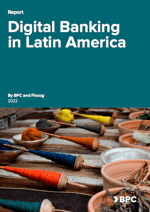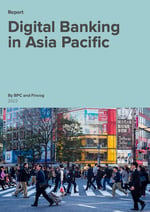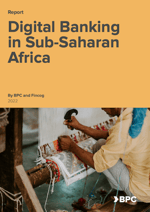Watch our recent online live webinar, 'The State of Digital Banking in the Middle East' with our key guest speakers Sreekumar Chellappan from Oman Arab Bank, Vibhor Mundhada from Mashreq Bank, Abdulla Al Suwaidi from Noor Capital and Joseph Khanachat from MasterCard moderated by Chitrajit Chakrabarti from BPC.
The State and Future of Digital Banking in the Middle East
Digitisation of financial services is gathering momentum across the Middle East and the industry is becoming more complex as consumer preferences evolve in line with digital innovations.
To learn more about the state and direction of digital banking in the region, I hosted a webinar with four distinguished digital banking leaders from the Middle East on August 4, 2020. The participants were:
- Sreekumar Chellappan: Head of Retail Assets, Oman Arab Bank
- Vibhor Mundhada: Head of Acquiring, Mashreq Bank
- Abdulla Al Suwaidi: Executive Director – Strategic Planning and Innovation, Noor Capital
- Joseph Khanachat: Head of Technology Account Management, Mastercard
Topics discussed
The webinar sought to explore the panelists’ opinions on digital banking in the Middle East, including their approach to digital payments, some of the common challenges they face, and the role of local regulations. As I will highlight below, we covered and discussed several key topics on these subjects.
Evolution of banking from traditional to digital
The panelists all reiterated one message; the shift to digital banking is happening, and the trend will continue at an accelerated pace. According to Mr Khanachat, digital banking is inevitable. An assertion evidenced by consumer preferences and industry trends including remote working, contactless payments, and the decline of branch networks.
Regarding the decline of branch networks, I sought the opinion of Mr Chellappan on the state of branch-based banking drawing on his 25 years experience in the Middle East banking sector. He believes that the shift from branch networks is gradual and may take several years. Branches will turn to relationship centres, especially due to the generational difference whereby some customers still value a personal touch.
According to Mr Mundhada, the growth of digital banking in the Middle East is tied to the proliferation of digital payments. In his role at Mashreq Bank, he has had the privilege of seeing the shift to online banking at first hand and notes that one in every four transactions are contactless with smartphones increasingly being used as digital wallets.
From a trading market perspective, Mr Al Suwaidi described digital transformation as a positive change in terms of trading volume and ease of doing business. But banks also need to be aware of security and technology risks.
Impact of COVID-19 on digital banking in the Middle East
How has COVID-19 affected digital banking in the region? The pandemic has significantly affected most if not all industries. In the banking sector, it seems to have accelerated the adoption of online banking services to cater for increased online traffic. Mr Mundhada suggested that banks need to be ready by aligning all their assets to be more digital.
Mr Khanachat was of a similar opinion suggesting that COVID-19 increased demand for fast-tracking and integration of mobile payments mechanisms such as Apple Pay and Samsung Pay into the Mastercard framework. One of the measures his organisation took was directing banks to allow customers to use expired cards.
Security and threat management
With regard to security and threat management, I asked Mr Chellappan to highlight some of the challenges faced by banks in the Middle East and any possible solutions. He pointed out the lack of behavioural scoring or AI-based monitoring in the sector, with most parties relying on rule-based monitoring. Additionally, banks tend to use several systems to monitor different transactions – pointing to an absence of system-wide monitoring.
Measures to help SMEs in online banking
SMEs play a crucial role in the economy. With this in mind, I wanted to understand some of the challenges these enterprises face. This query was directed to Mr Mundhada owing to the direct role played by Mashreq Bank on this topic. He said the main challenges SMEs face revolve around their technical ability to adopt complex payment systems. They also face challenges signing up with large acquirers and getting the payment gateways to accept their transactions. Mashreq understands these challenges and has introduced initiatives to help SMEs in the complex world of payments.
Open banking
Mr Khanachat believes that open banking is an essential facet of digital banking in the Middle East. Banks need to embrace and leverage API infrastructure to allow them to offer services based on customer needs, rather than their systems’ capabilities.
Cryptocurrencies
Another important facet of digital banking is the adoption of blockchain technologies such as cryptocurrency. Based on his experience and observation of success stories in Switzerland, Durban and a number of banks in the U.S., Mr Al Suwaidi believes that there is both demand and concern among consumers.
Concerns focus on the lack of a central regulatory authority and the risk of scams or money laundering. Taking all these factors into consideration, the best way forward lies in solving these challenges by developing relevant criteria.
What are the enablers for digital payments?
There are four critical aspects of digital banking in the Middle East or indeed anywhere in the world according to Mr Khanachat:
- Adaptability: ensuring you are ready to adapt and evolve.
- Scalability: the ability to scale efficiently.
- Data: data is a critical part of forming strong relationships with customers.
- Customer Experience: making services accessible and easy to use.
Mastercard facilitates the adoption of digital payments by offering secure and straightforward solutions. One of its initiatives to enable online banking is an advisory arm that helps banks design strategies for digital banking.
The role of central bank regulations
As one of the early adopters of online banking in the region, Mr Chellappan notes that Oman Arab Bank was forced to stop or revise some of its digital banking offerings after regulations were enforced. Currently, he believes that the government is doing an excellent job of guiding the industry.
An additional issue was raised regarding regulations surrounding digital signatures. All the panelists agreed that regulators are evolving their stance on the matter. Mr Al Suwaidi went on to point out the existence of regulations allowing electronic signatures as stipulated by the UAE’s Federal Law No. 1 of 2006.
Key developments areas to move forward – State of digital banking in five Years
As the webinar drew to a close, I asked some of the panelists to list key development areas going forward, including their vision of digital banking in the Middle East in five years’ time. Here’s what they had to say:
- Vibhor Mundhada: A change in mindset, a change in the mix of staff to include tech and UI/UX experts, and data will be at the heart of digital banking.
- Abdulla Al Suwaidi: There needs to be a clear roadmap for partnerships between governments and the private sector.
- Sreekumar Chellappan: Coordination between different players is essential for customers and banks to reap maximum rewards. He also reiterated Mr Khanachat’s assertion that ‘simple and secure’ should be the slogan going forward.
Key takeaways
Our panel of digital leaders in the Middle East region all agreed that digital banking is already here and that everyone in the financial sector should adapt to its inevitable evolution. Banks need to look at their internal and external processes/infrastructure while observing ongoing regulations.




